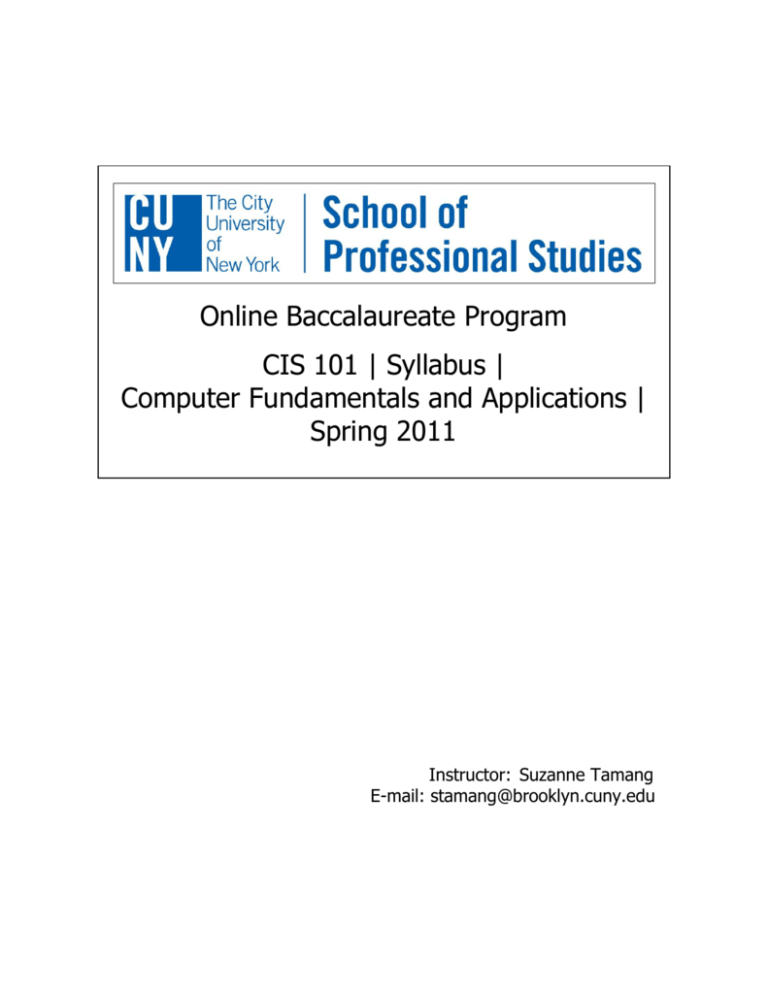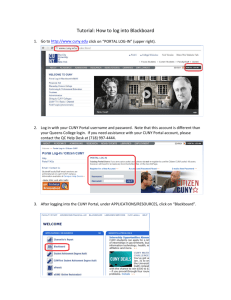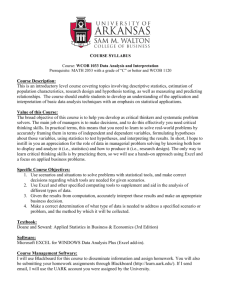Online Baccalaureate Program CIS 101 | Syllabus
advertisement

Online Baccalaureate Program CIS 101 | Syllabus | Computer Fundamentals and Applications | Spring 2011 Instructor: Suzanne Tamang E-mail: stamang@brooklyn.cuny.edu Course Description Credits: 3 This course is an introduction to computers and their use in information processing. Topics include hardware and software concepts, elements of telecommunications, networks, and the Internet. Emphasis is on using computer programs such as word processing, and spreadsheets, as well as Internet applications. Course Objectives After completing this course, students will be able to: • Identify and describe the fundamental hardware and software components of a typical computer. • Describe the Internet and the World Wide Web in the contect of an information network and understand some of its popular uses. • Discuss the impact of computing power on everyday life • Describe important historical events relevant to modern computer technologies. • Describe recent innovations and emerging technologies. • Identify individuals and other entities responsible for innovation in computer and infocmation science. • Apply the various skills necessary for productivity applications. • Apply the various skills necessary for creating and maintaining web-based content. Special Requirements You must be able to work, learn, and study independently. You must have a basic knowledge and usage of computers, application programs, the Internet, and email. You must have access to a reliable computer and the Internet, off campus, at home or at work. • You must have access to MS Office 2007 or later • • • • 1 Asynchronous/Online Course Overview Asynchronous learning is anytime, anywhere learning where students are not online at the same time, and where students proceed on their own schedules with some guidance from their instructor. The entire course will be conducted online. We will use Blackboard, an online course management system, for interacting with each other outside of class. Access to Blackboard will be made through the CUNY Portal and the course site will be available twenty-four hours a day and seven days a week. The course will operate on a weekly schedule of Monday through Sunday. You will complete and submit application assignments online, use the Internet as a communication and research tool, and create your own home page. Expect to spend a minimum of ten to twelve hours each week in studying on your own, contact with class members and the instructor via e-mail, discussion board forums, virtual classroom sessions, and ongoing-guided application and Internet projects. There will be weekly, assignments including review quizzes, and exams to complete. You will be required to log onto Blackboard at least three times a week. There will be a weekly lab assignment and a lecture review quiz assignment for chapters covered. All quizzes and exams will be administered online. In order to succeed in an online course setting, you must be especially selfmotivated. You must be able to work independently without a tutor, and be able to actively participate in your own learning experiences! More detail information about the course may be obtained on the course site on Blackboard with access through the CUNY Portal at www.cuny.edu/. Student Expectations and Responsibilities • Read, know, and adhere to the course’s policies and deadlines. • Log-in to the course site a minimum of three times a week, any time, twenty-four hours a day and seven days a week, to read announcements and review online materials. How long you need to be online depends on the activities for that session. • Check and read e-mail on a regular basis at least every other day. • Spend 10-12 hours per week studying and working on assignments for the class. • Keep up with the reading assignments, labs and group work. 2 • Participate in class discussion boards, and virtual classroom sessions. • Complete all assignments, review quizzes, and exams on time. • Create and follow a study and learning plan that permits for the achievement of the course’s objectives, and that fits your particular life style. • Ensure continued access to the Internet. Have a backup plan in the event you run into problems with your computer. 3 Learning Outcomes Student will be able to: • Identify basic components of the computer, describe their function, describe the different forms of data and how they are represented, and describe how data flows among the different parts of the computer. • Explain the structure of the Internet and the World Wide Web and the roles of the fundamental protocols that drive them Describe the components of an information system. • Differentiate and describe the system software and application software. • Demonstrate an understanding of computer-based communications media including network architectures, topologies and protocols. • Discuss the privacy, security, and environmental issues related to computers. • Use the operating system to perform basic file management operations on files such as copy, rename, delete, compression, and folder creation. • Utilize word processing software to create documents such as research papers and reports. • Use spreadsheet software to solve problems in areas such as manipulating budgets and financial plans. • Use web development software to create simple Web pages, including interactive elements. Evaluation and Grading Lecture Concepts Review Quizzes Exams during semester - Three Labs Group Assignments (Wiki Development) Participation Discussion Board 10% 30% 35% 10% 5% 10% Total 100% All lecture and lab exams will be administered online during the semester. Low states chapter quizzes, based on the lecuture, will occur after the reading material for a class section is complete. Exam dates will be announced well in advance. Students must take exams online within a designated time schedule and within a 4 time limit. NO other applications should be running on the computer and course materials should not be used. Attendance Policy Attendance is based on signing into the course site, participation in the discussion board, completion of assignments based on due dates, and replies to e-mail messages. If a student fails to sign-on to the course site, participate in discussion board, or fail to complete assignments by their due dates, such non-activity shall be deemed an absence. Furthermore, the Blackboard, the course’s management system software is capable of generating a report detailing each student’s time spent online on the course’s site, as well as which documents and other items the student has viewed. If a student posts merely a perfunctory (short) response on the course’s discussion board and if it is determined that the student spent only a minimal amount of time viewing course documents and other items, such facts shall also constitute an absence. Pursuant to the university’s policies, if a student is absent for one week, the student will receive a warning – sent via e-mail, and snail mail. If a student misses a second week, the student will receive a debarment. Students who have been debarred may be readmitted only if they can (1) show a valid reason for the absences (e.g. serious illness, death of a family member, etc.) and (2) show an ability to satisfactorily complete the course requirements. Academic Integrity Cheating is a serious violation of the College Code of Ethics. In a distance learning environment, it includes but not limited to: Plagiarism Having another person complete your assignments. Using your notes, textbook, the Internet, and/or other persons to complete exams unless otherwise instructed. More information may be obtained by reading the Academic Policies Handbook. 5 Required Textbooks and Software The following are the textbooks and software programs needed to be successful in this course. They can be found new or used on the publishers website, or Amazon (go through the CUNY site to give automatically contribute 5 % of the total purchase to the GC. The library receives this payment for ALL purchases not just for books and it is of no cost to you! http://library.gc.cuny.edu/info/amazon.html Software: Have access to or purchase MS Office 2007 or later Note: Earlier versions of Office will NOT do Purchase on the CUNY’s Portal eMall at: www.cuny.edu Lecture Text Discovering Computers 2011: Brief 1st Edition Authors: Shelly; Vermaat ISBN10: 1-4390-7942-0 ISBN13: 978-1-4390-7942-3 eTextbook: http://www.cengagebrain.com/shop/isbn/9781439079423 Online Course Companion: http://oc.course.com/sc/dc2010/?token= 6 WEEK WEEK 1 WEEK 2 WEEK 3 WEEK 4 WEEK 5 WEEK 6 WEEK 7 WEEK 8 WEEK 9 WEEK 10 WEEK 11 WEEK 12 WEEK 13 WEEK 14 WEEK 15 Lab / Lecture LECTURE: Intro, Overview and Syllabus, Class Guidelines & Contact Information, Netiquitte LAB: Learn Blackboard Interface, Course Survey LECTURE: Introduction to Computers LAB: Introductions Discussion Board Activity LECTURE: The Internet and World Wide Web LAB: Word Ch 1 – Creating and Document LECTURE: Application Software LAB: Word - Creating a (MLA) Research Paper EXAM 1 – Course material through Week 4 LAB: Discussion Board Activity – CS Timeline LECTURE: The Components of the System Unit LAB: Timeline Activity - Milestone 1 LECTURE: The Components of the System Unit (cot’d) LAB: Excel – Creating a Worksheet & Embed. Chart LECTURE: Input LAB: Discussion Board Activity – Biometrics LECTURE: Output LAB: Excel – Formulas, Functions, Formatting and Web Queries LECTURE: Storage LAB: What if Analysis, Charting and Working with Large Datasheets EXAM 2 – Course material through Week 10 LAB: Hypertext Mark-up Languages Part 1 LECTURE: Operating Systems and Utility Programs LAB: Hypertext Mark-up Languages Part 2 LECTURE: Database Systems LAB: Timeline Activity - Milestone 2 LECTURE: Communications and Networks LAB: Database Management Systems LECTURE: Computer Security, Ethics, and Privacy Week 14, 15 Quiz LAB: Networks Final Examination - Comprehensive 7 Course Material Blackboard Posted Materials Lecture Chapter 1 Lecture Chapter 2 MS Word Lecture Chapter 3 MS Word Lecture Chapter 4 Lecture Chapter 4 MS Excel Lecture Chapter 5 Lecture Chapter 6 MS Excel Lecture Chapter 7 MS Excel Lecture Chapter 8 Suppl. Materials Suppl. Materials Suppl. Materials






![[Podcast Release Date] - Baruch College](http://s3.studylib.net/store/data/008359763_1-82cf867f872dc479cb445ad091ea0f0c-300x300.png)